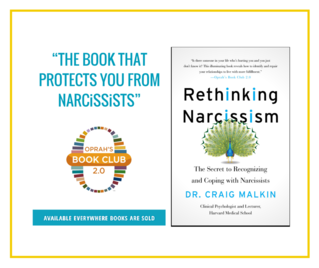A few weeks ago, I shared part one of the five most dangerous myths about narcissism. As I prepared to post part two, a sixth myth occurred to me (a little bonus!). So without further ado...
4) The Myth: If you're caring enough, narcissists will change.
This idea isn't one you'll usually hear from experts, but it sure is a popular (mostly unspoken) belief among people who still feel stuck in bad relationships. The logic goes something like this: "But if I'm really kind and supportive, and never lash out or get frustrated, then maybe s/he'll be nicer, too." See my articles on self-blame or why people stay in abusive relationships if you struggle with this one.
The Truth: I have endless faith in the power of self-awareness; if we're willing to dig deep, experience a depth of emotion we've rarely allowed ourselves before, it can truly transform us from the inside out. But it's always on us to do that work. No one can force us to do it, and no amount of caretaking will ever convince our loved ones to start the journey. Pathological narcissists with no commitment to understanding themselves will never change.
Hugging them more often won't bring them any closer.
Professing your love during their tantrums won't soften them.
Tiptoeing around until you feel like a ghost won't end their attacks.
Meditating daily to help you keep your cool won't stop the fights.
We have to be able to acknowledge the missteps and truly say when we're hurt (and when we're sorry). That's why I always teach people how to clearly express pain or disappointment in their relationships.
Your pain is justified. Don't bury it under mea culpas, fancy dinners, or gentle kisses on the cheek. Find a way to express it clearly. If your loved one truly hears it--allows your pain to move them-- that's how you'll know there's real hope.
5) The Myth: There's no such thing as healthy narcissism.
I've no doubt I'll receive a few more comments taking me to task for the "dangerous new" idea of healthy narcissism. The reality is healthy narcissism has been studied for decades, and the idea has been around in one version or another since the inception of the concept of narcissism, itself.
To date, there are three separate measures of healthy narcissism, including the NARQ's admiration, Wink's autonomous narcissism, and my research group's healthy narcissism. For a full discussion of why ignoring this evidence is dangerous, see here. For now I want to focus on what healthy narcissism is (hint: it's not self-esteem, self-care, or self-confidence).
The Truth: Healthy narcissism (also called healthy "self-enhancement") is a cross-cultural tendency, when we're happy and reasonably confident, to see ourselves through slightly rose-colored glasses. Think of it as a self-perception that's just distorted enough to keep us content without making us delusional. Interestingly, the more securely attached people are, the more likely they are to don these slightly rose-colored glasses for themselves (and their partners).
The reason the concept is important is that a lack of healthy narcissism causes pain in our lives. A lot of pain, in fact.
People who never self-enhance tend to be more anxious and depressed. They're not sure what they want or need. They lack healthy entitlement. Drawing from the myth of Narcissus, I've dubbed this problem echoism. (Echo was a nymph, cursed to repeat back the last few words she heard; and just as Narcissus fell in love with his reflection, Echo fell in love with him.)
Like Echo, those who struggle with echoism often struggle to have a voice of their own. They can be caring, empathic, warm, but they also tend to blame themselves whenever anything goes wrong. And like Echo, they tend to fall for extremely narcissistic partners.
I wanted to give echoists (and I'm formerly one, myself) a way of understanding and breaking their patterns. I wanted to give them a voice. That's one of the biggest rethinks in my book. But I couldn't talk about echoism without talking about healthy narcissism first.
6) The Myth: Narcissism, narcissist and NPD are all the same.
The Truth: This is both theoretically and scientifically inaccurate. Of the three terms, narcissistic personality disorder (NPD) is the only official diagnosis (people pathologically high in narcissism).
Narcissism has never been an official mental health disorder. Narcissist isn't a recognized diagnostic descriptor either; it's shorthand for someone who scores higher than the average on narcissism measures and may or may not be disordered.
Though they're often conflated, causing a great deal of confusion, narcissist, narcissism, and NPD are not one and the same. That's why a definitive text on the subject is called Disorders of Narcissism.
The first diagnosis for disordered narcissism was introduced by the founder of Self Psychology, Heinz Kohut in 1979, when he offered us the term narcissistic personality disorder, and it's been with us ever since. Prior to that people merely spoke of primary and secondary narcissism, or narcissism and pathological narcissism.
It's a mistake to talk about "symptoms of narcissism." What people usually mean is symptoms of pathological narcissism or NPD. And what they usually mean by narcissist is someone with NPD. But since many narcissists in the research never meet criteria for NPD, we're mixing two completely different groups of people.
Conflating these three terms has only caused harm by confusing the public into thinking, for example, there's a "narcissism epidemic."
So relax again, millennials. Even if you scored high enough on the NPI to be a "narcissist," that doesn't mean you have NPD. It also doesn't mean you're a narcissist for life. Evidence suggests that narcissism spikes in adolescence and then declines. Preparing most of us to realize we're not all that special by the time we reach middle age.
Thanks, middle age.
Where do you fall in the narcissism spectrum? Too high or too low? Take the narcissism test and find out.
Sign up for my newsletter, for more tips and advice, as well as information on my book, Rethinking Narcissism, devoted to understanding and coping with narcissism in all its forms, in our friends, lovers, colleagues-and even ourselves. On sale wherever books are sold; Harperwave and Harper UK.
A version of this article originally appeared at psychology today.



